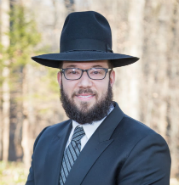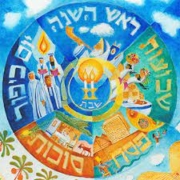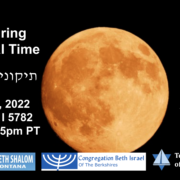Reflecting Greatness on Purim Katan

The story is told of a person carrying a very heavy parcel standing by the side of the road. A wagon driver pulls up next to them and in an act of kindness offers the struggling person a ride. When the driver turns around to check on the passenger they see that they are still exerting themselves holding the weight of the bundle above their head. “Why don’t you put your burden down on the bench next to you?” the driver asks. “You were so generous and nice to give me a ride, I don’t want you to have to carry this weight as well.” The driver gently reassures the person, “Don’t worry, I’m carrying you both already.”
In order to be maximally effective as a person, and balance what often feels like the weight of the world on our shoulders, we need a clear understanding of what we ourselves are doing and what is being done for us. Knowing the source of our strength informs our contributions to this world. Achieving this level of self awareness, though, is not easy.
Indeed, encoded into the story of creation we have a description of the difficulty of properly perceiving one’s agency:
וַיַּ֣עַשׂ אֱלֹקים אֶת־שְׁנֵ֥י הַמְּאֹרֹ֖ת הַגְּדֹלִ֑ים אֶת־הַמָּא֤וֹר הַגָּדֹל֙ לְמֶמְשֶׁ֣לֶת הַיּ֔וֹם וְאֶת־הַמָּא֤וֹר הַקָּטֹן֙ לְמֶמְשֶׁ֣לֶת הַלַּ֔יְלָה וְאֵ֖ת הַכּוֹכָבִֽים׃
G-d made the two great lights, the greater light to dominate the day and the lesser light to dominate the night, and the stars. Genesis 1:16
At first, the two luminaries are both described as “great lights.” But by the end of the verse, one is declared greater and the other is called lesser. The Talmud (Chullin 60b) explains the shift:
אמרה ירח לפני הקב”ה רבש”ע אפשר לשני מלכים שישתמשו בכתר אחד
The moon said before God, “Is it possible for two kings to use the same crown?”
The moon believes that it and the sun are being asked to share the title of “great lights.” The moon argues that there should be a hierarchy. Unfortunately, the moon lacks the perspective to realize that it is simply reflecting the sun’s light, so if only one of them is to be designated “great,” it will be the sun.
The Talmud continues:
אמר לה לכי ומעטי את עצמך.
G-d said to the moon, “Go and make yourself smaller.”
The moon’s preoccupation with power and influence blocked its own understanding of its role in the broader system. We are also illuminating forces, and we too need to be reminded that at our best we are a reflection of the Divine Light, and in partnership with G-d our greatness is limitless.
At the splitting of the sea during Nissan, the first month of the cycle of months, we witnessed the miracles and presence of G-d revealed. The Israelites pointed to G-d and said (Exodus 15:2): עָזִּ֤י וְזִמְרָת֙ יָ֔הּ וַֽיְהִי־לִ֖י לִֽישׁוּעָ֑ה זֶ֤ה אֵ-לִי֙ וְאַנְוֵ֔הוּ G-d’s stength and power to eradicate has been a salvation for me. This is my G-d אֵלִ-י֙, and I will beautify G-d. אַנְוֵ֔הוּ is also understood as a coexistence; אני והו – I and G-d. Adar, (א – דר) the last month of the year, supports our heightened awareness and reunification of G-d’s presence, particularly when we are farthest from the source of G-d’s revealed nature.
Esther, whose allusion in the Torah is from the verse וְאָנֹכִ֗י הַסְתֵּ֨ר אַסְתִּ֤יר פָּנַי֙ בַּיּ֣וֹם הַה֔וּא – I will keep My countenance hidden on that day (Deuteronomy 31:18), represents the Aleph, a reference to the Oneness of G-d, being dominantly expressed from within the hiddenness; א – סתר. With her true identity concealed, Queen Esther approaches the king, understanding that her life is very much on the line. As she gets closer, she is not concerned that she might fail in her attempt to save the Jewish people or end up dead like the previous queen, but her anxiety is focused on no longer having the companionship of G-d. The Bavli, Megillah 15b, teaches:
אָמַר רַבִּי לֵוִי: כֵּיוָן שֶׁהִגִּיעָה לְבֵית הַצְּלָמִים, נִסְתַּלְּקָה הֵימֶנָּה שְׁכִינָה. אָמְרָה: ״אֵ-לִי אֵ-לִי לָמָה עֲזַבְתָּנִי״?!
Rabbi Levi said: Once she reached the chamber of the idols, the Divine Presence left her. She said: “My G-d, my G-d, why have You forsaken me?
When King David feels powerless, he expresses it in Psalm 88:5 as כְּגֶ֣בֶר אֵֽין־אֱיָֽל – literally as a person without strength, but the rabbis understand it as “ as person feeling they are without אֵ-לִי”. Rav Chaver points out that the word ישראל is composed of the letters שר אל-י. What makes us an empowered nation is our relationship with G-d, conscious of our dynamic responsibility in it.
Giving proper attribution to the source of our power reminds us of the investment that G-d is making in sustaining us. The Talmud, Bavli Bava Metzia 12b, teaches in the name of Rabbi Yochanon:
גדול וסמוך על שלחן אביו זהו קטן – An adult that relies on their parent’s table is called a katon
Purim Katan, which is completely dependent on Purim in the second Adar to exist at all, provides a gentle comfort in our pursuit of justice. Even in the darkest of times, we remember that with G-d’s help anything is possible. All of us are katan in relationship to God, and by fully acknowledging our dependence on Heavenly Assistance, we find the strength to continue journeying to try to make the world as God wants it to be.

Rabbi Mike Moskowitz is a founding builder at Bayit.









